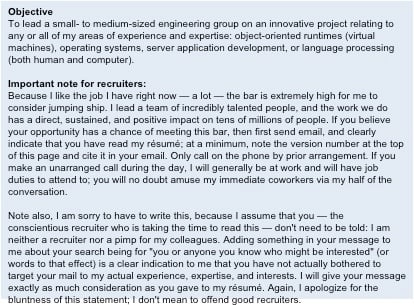Recruiting Toolbox Blog
"Contact me. I dare you." Notes on the War for Talent
I rather enjoy sourcing software architects, designers and developers. Sorting through their blogs reveals what's new in software languages, design styles and technical functionality. Software engineering blogs are often quite personal; these guys and gals don't seem to mind sharing their passions: vintage animation, science fiction, improvisational theatre, container gardening.
Resumes of top candidates -- from top companies, with top Computer Science degrees -- are publicly available, with complete contact info. "Contact me. I dare you," they seem to say.
As for the poor suckers recruiters responsible for hiring software engineers, good luck with that. A Google Android engineer posted this note to recruiters:
These folks are sharp. They are talented. They know their worth. They know what they want to do. They will only work on projects or in languages that interest them. More often than not, they can afford to work for the sheer pleasure of producing beautiful software. Their companies do everything possible to keep them. Fully understanding the recruiting process, they flaunt their talent on the internet, making themselves even more desirable. They demand "green room' perks. No commute. Top-of-the-line equipment. Free food. The ability to work on side projects.
For this kind of "talent" there is a "war". In many organizations, software developers are the key to the most important business priorities. Their work produces innovation, increases productivity or helps to streamline operating costs.
For almost all other non-technical workers without highly specialized and in-demand skills, there is no war. Companies will continue to seek productivity gains, operating efficiencies and growth-driving innovation. Productivity gains, once achieved, result in a smaller work force. The same goes for reduction in operating costs. Only growth drives the need for workforce expansion, and even that can be contained.
So the "War for Talent" takes a slightly different turn than what McKinsey & Company predicted back in 1997 (yes, the "war" is 14 years old). The war is on -- but not for all talent. With a few exceptions, recruiting and sourcing for most positions will not experience much salary pressure or talent shortages. Finding good people is -- and always will be -- a critical core competency for successful companies. But in the U.S., there is an ample supply of good people for ordinary jobs.
So the recommendations McKinsey made 14 years ago, such as "recruit great talent continuously" or "create an Employee Value Proposition that attracts scarce talent" still resonate. But applying even-handed strategies no longer makes sense. McKinsey advised organizations to differentiate investment in top performers and low performers. That's exactly what they're doing in the executive suites. In recruiter row, we should take a page from that book and differentiate our investment in recruiting and sourcing resources and tools according to talent scarcity. The biggest investment should go to the most in-demand, scarcest talent.
Even if that means investing in improv theatre festivals or unlimited supplies of M&Ms.

